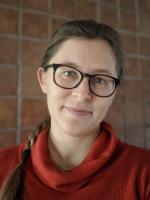Bonnie McLarty is an award-winning composer and collaborative pianist who writes "beautifully written, singable, and rewarding" music for many different instruments, voice types, and styles. She has had her work performed in Italy, Scandinavia, and across the United States. In this interview, Bonnie shares more about her creative process and how she goes about creating community through music.
*
Please introduce yourself and describe your music for new listeners.
Hi, I am Bonnie McLarty, and I’m a composer, music educator, and pianist. I currently live in rural Johnson County and teach music theory courses at UMKC and Benedictine College. I write music that explores the intersection of western “art” music with other musical traditions and other forms of art, particularly poetry. For me, making music is about creating community through shared experience and story-telling. I have had the privilege of collaborating with several local poets, including Wyatt Townley and Caryn Mirriam-Goldberg. My chamber opera Snow Angel was recently performed by members of the University of Kansas Orchestra under the direction of Dr. Carolyn Watson.
How does your work as a music educator and a collaborative pianist inform your work as a composer?
As a pianist, I’ve specialized collaborative repertoire, making music with other musicians in a variety of environments and styles. When I’m performing, I am really drawn to the pieces in which the composer has thought of the performers as well as the listeners in the way the musicians get to work together to create a sound, or exchange a sort of dialog. I want the music I write to result in a music-making experience that is rewarding for the performers as well as the listeners, a shared experience between the ensemble and the audience.
You've composed a lot for voice using texts from poets. How do you go about selecting the texts you want to work with? Are there themes or styles of text that you're drawn to in particular?
When I’m considering poetry for musical treatment, I look for several things. I look for a story or experience or imagery that moves me personally in some way. I also look for words that invite some sort of musical setting, where the poet has crafted the rhythm and pacing in a way that leaves room for the music to interact with the words.
You've said that you're particularly interested in creating community through music. Can you talk more about what this looks like as part of your creative process?
As a composer, a lot of my time is spent alone with my thoughts, with text, with notes on a page or a screen. I spend quite a lot of this solitary time shaping the musical lines in ways that I hope will really tell a compelling narrative. For me, the magic happens when I hand off my (semi) finished musical score to the musicians and together they transform the notes on the page into a musical experience. Unlike a work of art that you can look at or read or touch, music is this ephemeral art form that requires a community to create and recreate. For me, that is very special, and I’m truly privileged to be part of this process.
What music are you raving about right now?
I really connect to the story-telling in Sarah Kirkland Snider’s Penelope and Julia Wolfe’s Fire In My Bones, two works that tell women’s stories from a first-person perspective. I’m also a fan of the glorious and virtuosic genre-bending projects from artists like Edgar Meyer, Yo-Yo Ma, and Chris Thile.
Bonnie's recommendations from the Johnson County Library catalog.
This recording is nerdy and virtuosic. My favorite track is probably "Trappings" which features vocals by Aoife O'Donovan. The music starts with a pop-style four-chord loop and works together with the music to create a very directional narrative, with a final transformation and sense of sunlight/brightness in the final part of the song.
Shostakovich Preludes and Fugues Op. 87
Introspective, quirky, and clean, this set of Preludes and Fugues is Shostakovich's response to Bach's Well-Tempered Clavier. This recording by Tatiana Nikolayevna is considered by many to be the authoritative interpretation, but if you get the chance, check out jazz pianist Keith Jarrett's performance, which injects a lovely warmth into these pieces.
Kansas is home to some truly world-class poets. I highly recommend both The Afterlives of Trees and Rewriting the Body by Wyatt Townley.
Taking a turn away from the arts and towards the workings of the human mind, I highly recommend The Righteous Mind by Jonathan Haidt, especially for thinking about how to communicate more clearly and compassionately with people who don't see the world the way I do.

